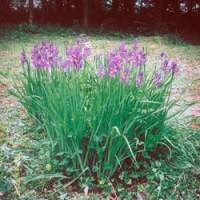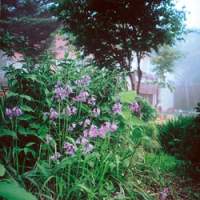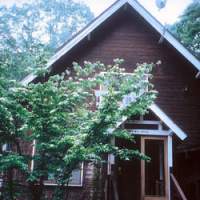When I was a young lad in South Wales I used to collect, press and catalog wild flowers. Then I reached the age of 12 and went to an all-boys school in England, where my seniors soon taught me that flowers were for sissies. So I kept this love to myself.
But 10 years later, when I came to Japan, I learned from one of my karate teachers that it was perfectly manly to like flowers. In 1981, my second year living here in Kurohime in Nagano Prefecture, I met another man, a very manly man, who also loved flowers and who had an amazingly wide knowledge of them. He became a very dear friend.
Many of you who read this column will know and remember him. His name is Eiji Nakahara, and he was the owner of the Tatsunoko pension in Kurohime. Back in the "bubble" years when hordes of Western money-market traders and bankers were living in Tokyo, that pension became extremely popular. By word of mouth, Tatsunoko's fame spread through the foreign community until about 90 percent or more of Eiji's clients were Westerners.
Eiji didn't especially select Westerners, but they just kept booking well in advance and coming back with friends. Eiji was a very congenial host indeed. Back then, for a year, I had a weekly television outdoor-cooking program. Eiji coordinated the program for me, and catered to the guests and the TV crew who came for the show. Then I went off again to the Arctic for three months, which canned the show, but Eiji carried on for another couple of years with his own regular TV cooking program. He was a superb chef, which is another reason for the popularity of his pension.
Over the last 25 years I have had so many guests and done so many TV shows, Japanese and foreign, here in Kurohime. I've also written dozens of serials and many, many articles for magazines and newspapers; published well over 100 books and given countless interviews. Through all that time, nearly all those visitors stayed with Eiji.
At Tatsunoko you would have wild mountain vegetables or wild mushrooms in season, as well as pheasant, duck and venison. Eiji served the freshest and best of fish from the Sea of Japan, which is just an hour's drive away. He was very particular about getting the very best and healthiest vegetables, usually locally, and when he served meat or poultry other than wild game, he was fussy about that too.
I spend a lot of time alone in Kurohime, and whenever Eiji knew I was here by myself he always invited me over to join the evening meal with his family and employees. (They were even better than the meals he served to his paying guests!) I've downed enough wine, beer, sake, shochu and whisky at Eiji's place to float the battleship Yamato. And parties? Oh man, what parties!
Whenever I had guests from abroad, including people like the Canadian writer Margaret Atwood, crews from the BBC or the globetrotting British comedian Michael Palin, Eiji catered to them all.
He visited me when I had a place in Galicia, Spain. He came with me when we had the forest-twinning ceremony (that I wrote about here) between our woodland trust in Kurohime and the Afan Argoed Forest Park in Wales. We've been all over Japan together. For 25 years, through good times and bad, Eiji has been my closest friend. He knew pretty well everything about me, including my love of wild flowers.
Eiji died very suddenly on June 10 of this year. It was a terrible shock, although I knew in detail of his fight with cancer. He was a year younger than me, and I was sure he was going to beat it. Eiji had a dream. He wanted to build a small but exquisite Japanese inn associated with our woods. We had talked of this for years, and on May 31, just 10 days before he died, our trust's board of directors agreed to his plans and gave him the go-ahead to start building on a part of our trust land, a bit that sort of juts out from the woods and commands a magnificent view. We agreed that his inn would co-operate with us in a continual study of the seasonal use of wild woodland foods, firewood charcoal and fragrant herbs that could be used in a bath. We would guide guests who wished to visit the woods. When I told him, delight lit up his whole face and I was confident then that he could and would beat the damned cancer.
It was not to be so, and on June 11, when he was laid out and people from all over came to pay their final respects, I got so choked up that, with a dull empty ache in my heart, I went out to the back of Tatsunoko, where Eiji has been nurturing a small garden of trees and wild flowers. This was where Eiji had been pottering around the day before he died.
There I discovered a lovely patch of bluebells, in full bloom. Eiji knew that bluebells were among my most favorite of flowers, and of the carpets of bluebells that would spread through British woodlands in late spring and early summer. I recalled telling him, too, how the bluebell (Hyacinthioides non-scriptus), with its fleshy and delicate stem, was difficult for me to press well as a child. I don't know where he found the bluebell bulbs, because they are not native to Japan and I've seen very few around.
His patch of bluebells was close by a fine yamaboshi (Japanese dogwood tree; Cornus kousa) which was one of his favorites. It was in full bloom, as is the dogwood that Eiji planted for me just outside my front door. It has splendid white flowers and, later on, round, red, dimpled fruit, rather sweet to the taste and a great treat for birds and hornets.
As I write here in my study in Kurohime, I recall this time last year, when Eiji and I were training in my dojo-gym on the floor below. At this time of year the wild blue field iris (Iridaceae) blooms and, for a few short days, countless thousands of what look like little butterflies flitter and dance way up in the canopy of the deciduous trees. (I've written about these here, too, explaining that they are actually day-flying moths). It is a time of year when only glimpses of the Torii River can be seen from my study window through the dense green of Japanese oak, mountain cherry and sycamore foliage which almost totally hides Kurohime Mountain too.
A ki-bitaki (Narcissus flycatcher; Ficedula narcissina) is warbling a beautiful repertoire of songs. It is a lovely little bird, with yellow, black and white plumage, rather shy to show itself, but not at all shy in singing. Bird songs, and the sound of a rushing river, comfort me in a grief which I know many of you will share.
I'll go down and work out for a while when I finish. But I don't have the heart to tidy away Eiji's gear, which is hanging on a training bar where he left it.







